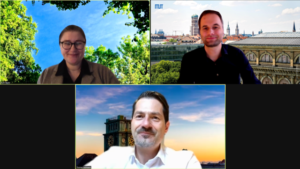The Department of Science, Technology and Society (STS) at the TUM School of Social Sciences and Technology is dedicated to understanding the larger ethical, social, political and legal dimensions of science and technology. Embedded in TUM’s unique innovation ecosystem, we are committed to enabling a more responsible and sustainable engagement with science and innovation through social science research, teaching and public dialogue – often in collaboration with partners from technical fields.
About the STS Department

TUM is launching the new Department of Science, Technology and Society (STS) as part of a major restructuring of the university. The department, which is part of the School of Social Sciences and Technology, will be the new academic home for the 70+ researchers formerly affiliated with the Munich Center for Technology in Society (MCTS) as well as a number of new faculty appointments in the field of STS over the next three years. The department expands the institutional groundwork laid by MCTS since 2012 to put society at the center of innovation and at the heart of the mission of a technical university.
The STS department is dedicated to understanding the larger ethical, social, political and legal dimensions of science and technology. Embedded in TUM’s unique innovation ecosystem, we are committed to fostering a more responsible and sustainable engagement with science and innovation through social science research, research, teaching and public dialogue – often in collaboration with partners from technical fields. The TUM STS community strives to provide the critical intellectual and practical resources to face the challenges of highly technologized societies and to train future leaders with a unique sensibility for the challenging interfaces between science, technology and society. As one of Europe’s largest hubs for STS, the department maintains close collaborative ties to other parts of TUM (for example on the future of mobility, responsible robotics and algorithms, or life science management) as well as to leading STS centers in Germany and around the world.
Innovation, Society & Public Policy

Innovation has become a leitmotif of policy-making and institution-building around the globe.
Law, Science and Technology

The research group Law, Science and Technology of the Department for STS is dedicated to the reciprocal relationship of law, science, technology and society.
Philosophy of Science

Science and technology are facing a dramatic upheaval, as the masses of research data are no longer manageable without intelligent algorithms.
History of Technology

The research activities within the history of technology subject area of at TUM focus on processes of humankind’s move from the biotope to the technotope.
Sociology of Science

Our observation: Society and technology have entered into an extremely dynamic, reciprocal relationship.
Anthropology of Science and Technology

Our core interest lies in developing ‚knowledge after progress‘.



